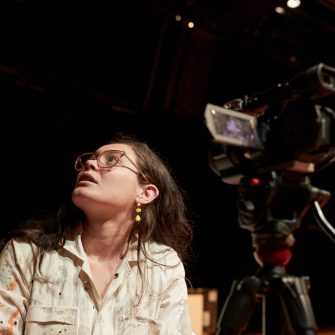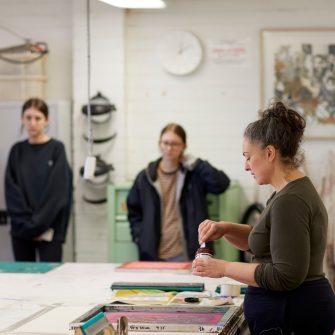Master of Applied Linguistics
- Commencing Terms
- Term 1, 2 & 3
- Duration
- 2 Year(s)
- Delivery Mode
- Face-to-face (includes blended)
- Campus
-
Kensington
- Codes
- Program code 8236
- CRICOS code 083248M
-
2026 Indicative first year full fee
- $33,000*
-
2026 Indicative full fee to complete degree
- $67,500*
-
2026 Indicative first year full fee
- $47,000*
-
2026 Indicative full fee to complete degree
- $98,500*

Application closures for 2026
Undergraduate programs for 2026 intakes are closed for New Overseas Student Commencement (NOSC) applications. Applications for postgraduate programs remain open. Find out if this closure applies to you.
- Overview
- Entry requirements
- What will I study?
- Future careers
- How to apply
- Fees & Scholarships
Overview
The UNSW Master of Applied Linguistics is a two-year full-time postgraduate degree that will prepare you to develop linguistic knowledge for intercultural communication in diverse professional, educational and interdisciplinary settings.
You'll graduate equipped to work in a range of fields, exploring the language used in all fields of activity. You'll develop language technologies, highlight communication within and across different cultures, and may work in conjunction with grassroots community users or assist migrant communities. You'll be able to work with the acquisition of first and second languages and investigate different discourses, such as those used in political, medical, legal and educational settings.
Key features
Recognition of prior learning
Pace your degree with the option of graduating from between one and two years based on recognition of your previous studies and experience.
Career-focused
Study according to your career goals. Combine your chosen electives with training on traditional core areas of language structure. Explore applications to the world of work and to ongoing research.
Learn from the best
Our linguistics academics are highly qualified, active researchers with experience in intercultural communication, second language acquisition, bilingualism, multilingualism and multiculturalism, the pragmatics of language use and in language technology in documenting under-researched languages. You'll be able to participate in ongoing research projects and engage with developments in the field of applied linguistics.
Why study at UNSW?
- We're ranked #4 in Australia and =#46 globally for arts & humanities (QS World University Rankings by Subject, 2025)
- Be supported by our diverse, collaborative and inclusive Arts, Design & Architecture community.
- Learn through research-informed teaching
- Prioritise career success – UNSW has been awarded Most Employable students for six years in a row (Australian Financial Review (AFR) Top100 Future Leaders Awards, 2020–2025)
- Benefit from strong industry links and partnerships
- Access world-class alumni connections
- Join a global top 20 university (QS World University Rankings, 2024–2026)
- Join a community that’s part of the prestigious Group of Eight (Go8) universities
Want to see more from UNSW Arts, Design & Architecture?
Entry requirements
There are three different streams of the Master of Applied Linguistics. The stream you apply for will depend on the depth of your prior academic and/or professional experience, and how closely it relates to linguistics.
You may be eligible to have your study recognised via Recognition of Prior Learning (RPL). If your work experience or prior study is recognised, credit points can be counted towards the degree, and you would then be able to complete the coursework undertaking fewer subjects.
For all three streams, you will need to meet the following admission requirements to be considered for entry into the program:
For the 1 year stream (A)
- Honours degree or Graduate Diploma* (or equivalent qualification) in a relevant discipline with a record of academic achievement equivalent to a UNSW credit average of 65%.
- Bachelor degree (or equivalent qualification) in a relevant discipline with a record of academic achievement equivalent to a UNSW credit average of 65%.
For the 1.7 year stream (B)
- Bachelor degree (or equivalent qualification) in a relevant discipline with a record of academic achievement equivalent to a UNSW credit average of 65%.
- Bachelor degree (or equivalent qualification) in any discipline with a record of academic achievement equivalent to a UNSW credit average of 65%.
- Honours degree or Graduate Diploma* (or equivalent qualification) in any discipline with a record of academic achievement equivalent to a UNSW credit average of 65%.
For the 2 year stream (C)
- A Bachelor Degree or equivalent with a record of academic achievement equivalent to a UNSW credit average of 65%.
*It is expected that a Graduate Diploma will have been completed after an undergraduate degree.
Relevant disciplines include Linguistics; Languages; TESOL; Cognitive Science; Philosophy; Speech Pathology; Interpreting and Translation; Health Sciences.
Applicants with a degree in a discipline not listed here but who wish to make a case for its academic relevance may apply and will be assessed on a case-by-case basis.
English language requirements
You may be asked to provide evidence of your English proficiency to study at UNSW depending on your educational background and citizenship. English language skills are vitally important for coping with lectures, tutorials, assignments and examinations - this is why UNSW requires a minimum English language competency for enrolment.
If you’re completing an Australian Year 12 qualification (e.g. NSW HSC or equivalent), you do not need to provide anything extra to prove your proficiency. Your qualification will be used as evidence of your English proficiency.
If you do need to provide evidence of your English proficiency, this will be indicated in your application. You can prove this by providing evidence that you meet one or more of the following criteria:
- English language tests and university English courses
- Prior study in the medium of English
- Other qualifications
If you need to improve your English skills before you start your degree, UNSW College’s Academic English Programs are for you. The programs are suitable for various English levels and help you prepare for university studies and life in Australia.
For more details, visit the English Language Requirements page.
There are three different streams of the Master of Applied Linguistics. The stream you apply for will depend on the depth of your prior academic and/or professional experience, and how closely it relates to linguistics.
You may be eligible to have your study recognised via Recognition of Prior Learning (RPL). If your work experience or prior study is recognised, credit points can be counted towards the degree, and you would then be able to complete the coursework undertaking fewer subjects.
For all three streams, you will need to meet the following admission requirements to be considered for entry into the program:
For the 1 year stream (A)
- Honours degree or Graduate Diploma* (or equivalent qualification) in a relevant discipline with a record of academic achievement equivalent to a UNSW credit average of 65%^.
- Bachelor degree (or equivalent qualification) in a relevant discipline with a record of academic achievement equivalent to a UNSW credit average of 65%^, plus one year relevant professional experience.
For the 1.5 year stream (B)
- Bachelor degree (or equivalent qualification) in a relevant discipline with a record of academic achievement equivalent to a UNSW credit average of 65%^.
- Bachelor degree (or equivalent qualification) in any discipline with a record of academic achievement equivalent to a UNSW credit average of 65%^, plus one year relevant professional experience.
- Honours degree or Graduate Diploma* (or equivalent qualification) in any discipline with a record of academic achievement equivalent to a UNSW credit average of 65%^.
For the 2 year stream (C)
- A Bachelor Degree or equivalent with a record of academic achievement equivalent to a UNSW credit average of 65%*.
*It is expected that a Graduate Diploma will have been completed after an undergraduate degree.
^Students from a non-211 university in China are now required to have a record of academic achievement equivalent to a UNSW distinction average (75%).
Relevant disciplines include Linguistics; Languages; TESOL; Cognitive Science; Speech Pathology; Interpreting and Translation; Health Sciences.
Applicants with a degree in a discipline not listed here but who wish to make a case for its academic relevance may apply and will be assessed on a case-by-case basis.
English language requirements
You may be asked to provide evidence of your English proficiency to study at UNSW depending on whether you are from an English-speaking background or non-English speaking background. English language skills are vitally important for coping with lectures, tutorials, assignments and examinations - this is why UNSW requires a minimum English language competency for enrolment.
If English is not your first language, you’ll need to provide proof of your English proficiency before you can be given an offer to study at UNSW. You can do this by providing evidence that you meet one or more of the following criteria:
- English language tests and university English courses
- Prior study in the medium of English
- Other qualifications
If you need to improve your English skills before you start your degree, UNSW College’s Academic English Programs are for you. The programs are suitable for various English levels and help you prepare for university studies and life in Australia.
For more details, visit the English Language Requirements page.
Check the specific English language requirements for this program
What will I study?
UNSW is introducing a new academic calendar from 2028.
We are moving to a new flex-semester calendar. What does this mean for your studies?
Program structure
The Master of Applied Linguistics is available in three streams. The stream that you enrol in will depend on your existing experience and knowledge. The streams are referred to as Applied Linguistics A, B and C, respectively.
Applied Linguistics streams A and B recognise your prior learning and experience. Stream A has only 8 courses can be completed in one year of full-time study, while stream B has 12 courses and takes 1.5 years full-time study. Stream C is for people with limited prior experience and has 16 courses and two years full-time study.
The programs include:
-
- The Grammar of English
- The Structure of Language
- Language and Meaning
- The Use of Language
-
- Current Issues in Bilingualism
- Cross-cultural Pragmatics
- Research Methods in Linguistics
- Research Topics in Applied Linguistics
-
- Indigenous Languages of Australia
- Advanced Quantitative Research
- Advanced Qualitative Research
- Advanced TESOL Methodology
- Advanced TESOL Curriculum Design and Assessment
- Educational Research
- Contemporary Issues in Language Education
- Second Language Acquisition
- Language Technology
- Discourse Analysis
- The Sound System of English
- The Psychology of Language
- Thesis Writing 1
- Thesis Writing 2
- Documenting Linguistic Diversity
- Linguistics Practicum
- Research and Theories of Translation and Interpreting
- Multimedia Translation
- Specialised Translation
- Translation Technology
Full program structure
Each university year at UNSW has three terms and an optional summer study period. You can study full-time or part-time. Depending on how you plan your study load, you can fit two or three courses into a term and one course in a summer term.
This program is structured to acknowledge the skills that you bring to your postgraduate education. Depending on your level of experience, you can study a streamlined degree or study for the full two years. Below is an example of what you could study in a standard full-time study plan.
Stream: Applied Linguistics A - 1-year program
First year
- 2 Core courses
- 2 Elective courses
- 4 Core research courses
Stream: Applied Linguistics B - 1.7-year program
First year
- 2 Core courses
- 2 Elective courses
- 4 Research courses
Second year
- 1 Research course
- 3 Elective courses
Stream: Applied Linguistics C - 2-year program
First year
- 4 Core courses
- 4 Research courses
Second year
- 1 Research course
- 7 Elective courses
For further information on full course details, listing, descriptions and timetables please see the UNSW Online Handbook.
Future careers
Linguistics has become one of the most dynamic areas of social science research. It impacts areas such as language technology, social psychology, cognitive science, international relations, climate change research, refugee studies and media studies.
UNSW Master of Applied Linguistic graduates are in high demand for their ability to describe, analyse and research languages. You'll be able to pursue a career in foreign and second language education in Australia and all around the world. Our academics help shape your journey from student to career-ready linguistics and applied linguistics specialist.
Potential careers
Applied Linguistics leads to careers in the field of foreign and second language education, including
- Teaching English as an Additional Language or Dialect (EAL/D)
- Teaching English to Speakers of Other Languages (TESOL)
- Researching diverse aspects of second language acquisition and language use in society
- Consultancy in inter-cultural communication
- Discourse analysis for media and professional communication
- Discourse analysis for corporations and market research
- Advocacy for linguistically disadvantaged groups including refugees and immigrants
- Language policy advisory role in government departments
- Policy and curriculum development in bilingual and second language contexts
- Language technology for speech recognition and production, documenting under-researched languages and other digital technology including the development of search engines and machine translation
Research pathways in linguistics
Our straightforward research pathways are open to high achieving Master of Applied Linguistics students seeking further study in a Higher Degree by Research.
Students will complete a PhD or Masters by Research on a topic of particular interest in applied linguistics, under expert supervision.
How to apply
Applications must be submitted through our Apply Online portal. We encourage you to submit your completed application as early as possible to ensure it will be processed in time for your preferred term. Some high-demand programs and Faculties with limited places may have an earlier application deadline or commencement date. Find out more.
Ready to start your application?
For most international students, applications are submitted via our Apply Online service. We encourage you to submit your completed application as early as possible to ensure it will be processed in time for your preferred term.
Some high-demand programs with limited places, may have an earlier application deadline or may have an earlier commencement date. For details, visit the international admissions information page.
Ready to start your application?
Fees & Scholarships
*Fees are subject to annual review (or when required) by the University and may vary accordingly.
Indicative fees are a guide only and have been calculated based on the typical enrolment patterns of students undertaking the program. The indicative fees listed here is an estimate for tuition only and excludes non-tuition fees and charges. The amount you pay will vary depending on the calendar year of enrolment, the courses you select and whether your study load is more or less than 1 Equivalent Full Time Student Load (48 units of credit (UOC) per year).
You should not rely on indicative fees as fee increases are assessed when required and may exceed the indicative figures listed here. Actual fees are calculated on enrolment. More information on fees can be found at the UNSW fees website.
*Fees are subject to annual review by the University and may increase annually, with the new fees effective from the start of each calendar year. The indicative fees listed here are based on an estimated average and are for tuition only, other fees and charges are not included. The amount you pay will vary depending on the calendar year to enrol, the courses you select and whether your study load is more or less than 1 Equivalent Full Time Student Load (8 courses per year).
Indicative fees are a guide for comparison only based on current conditions and available data. You should not rely on indicative fees. More information on fees can be found at the UNSW fees website.
Indicative fees to complete the program have been calculated based on a percentage increase for every year of the program. Fee increases are assessed annually and may exceed the indicative figures listed here.
Indicative fees to complete the program include tuition plus an estimate of study-related costs of approximately $1,000 per year. To find out more about other costs, visit UNSW International.
Scholarships
At UNSW, we award over $83 million in scholarships each year. We pride ourselves on rewarding excellence and making university accessible to students from all walks of life. Whether you’re a domestic or international student, our range of scholarships, prizes and awards can support your journey.
Progress starts here – at a world-leading university

Top 20 Worldwide
Ranked in the global top 20 for three consecutive years
QS World University Rankings, 2024–2026

Winner of the AFR Most Employable University Award six years in a row
AFR Top100 Future Leaders Awards, 2020–2025

Australia's #1 for Innovation
Highest number of startups and spinouts from university-developed tech
SCOPR report, 2024
"I think studying a language and culture that’s so fundamentally different from my own inevitably gave me a broader world view."




